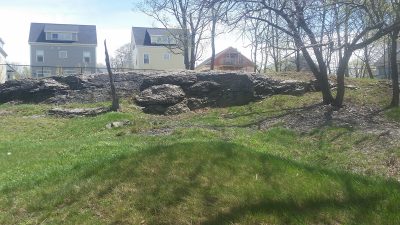Untouched for 30 years, a vacant plot of land on Savin Hill in Dorchester will soon begin its transformation into a green space — to be decorated with a flower garden and arbors, as well as additional community resources.
Mayor Martin Walsh announced last week in a statement that the city will turn the 21,000 square-foot property into an “urban oasis.” The space will be jointly maintained by community members and non-profit Boston Food Forest Coalition, which will act as the owner and developer of the space.

Orion Kriegman, executive director of the BFFC, a community land trust that promotes food justice and sustainable urban agriculture, said he first spoke with nearby residents in 2017 about their concerns regarding the vacant lot.
“When we listened to the neighbors, their main concern was that they did not want the space to be dissolved,” Kreigman said. “They wanted it to remain a community open space, which is exactly why the [BFFC] was formed.”
Kriegman said the project is also helping to draw community members closer to each other, as people who have never interacted before are now convening around their interest in making the space come alive.
“It’s weaving relationships across the diversity in the neighborhood, which is something that the [BFFC] sees as a big impact of what we do,” Kriegman said. “It’s more than just building a new community open space, it’s also deepening people’s relationships, creating space for cultural events to happen and creating stronger community resilience.”
Kreigman said the coalition received $20,000 to start the process, but it won’t be enough to finish the entire project. While the sum will allow BFFC to initiate the transformation process, the organization hopes to obtain other resources.
“We do things very affordably because we are very grassroots and we are a very small organization,” Kreigman said. “We do things that have a lot of volunteer support, and that keeps the cost down.”
The green space will be a “wildlife habitat,” Kreigman said, centered around supporting pollinators that have been threatened by the rapid development of open space in Boston.
The space would also include a combination of wildlife meadow, a few specimens of trees, pathways to help people navigate the area and a gazebo to attract community activity.
Aside from its nature-related decor, the lot will also offer exercise equipment and a lending library, according to Walsh’s public statement.
Safe open community spaces like this can help reduce stress and produce better mental health outcomes for kids and adults alike, Kreigman said, especially with growing dependency on digital entertainment and social media.
“We’re so wrapped up in our screens and our human-made world,” Kreigman said. “And we forget our connection to the broader environment.”
Peter McNamara, chairman of the neighborhood group partnering with BFFC, said he lives right atop Savin Hill. He said he is eager to help with the transformation, as he is retired and has ample time on his hands.
“I’m very excited about it and I think that everyone else has been too,” McNamara said, “because the biggest fear was that there was going to be another building.”
Marissa Resnick, 26, of Allston said she believes adding a park in the neighborhood might disrupt the look of the area.
“I don’t know if people in Dorchester will be happy,” Resnick said, “because adding a park gentrifies the area.”
Alden McWayne, 18, of Dorchester said he believes that the park will help even the balance between urban and suburban residential life.
“I’m a lover of the outdoors,” McWayne said, “and I think Dorchester could use more green spaces for relief from city life.”























































































































